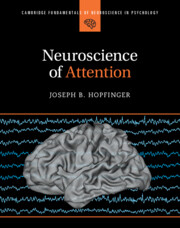Refine search
Actions for selected content:
18 results
Cognitive stylometry: A computational study of defamiliarization in modern Chinese
- Part of
-
- Journal:
- Computational Humanities Research / Volume 2 / 2026
- Published online by Cambridge University Press:
- 05 December 2025, e1
-
- Article
-
- You have access
- Open access
- HTML
- Export citation
15 - Computational Neuroimaging
- from Part IV - Complementary Methods
-
- Book:
- Introduction to Human Neuroimaging
- Published online:
- 23 December 2025
- Print publication:
- 16 October 2025, pp 315-329
-
- Chapter
- Export citation
Chapter 12 - Pain in the Brain
- from Section III - Emotion Perception and Elicitation
-
-
- Book:
- The Cambridge Handbook of Human Affective Neuroscience
- Published online:
- 16 September 2025
- Print publication:
- 02 October 2025, pp 248-265
-
- Chapter
- Export citation
Placebo and nocebo phenomena in schizophrenia spectrum disorders: a narrative review on current knowledge and potential future directions
-
- Journal:
- Psychological Medicine / Volume 55 / 2025
- Published online by Cambridge University Press:
- 18 July 2025, e199
-
- Article
-
- You have access
- Open access
- HTML
- Export citation

Neuroscience of Attention
-
- Published online:
- 02 May 2025
- Print publication:
- 22 May 2025
-
- Textbook
- Export citation
Chapter Six - Speech Sounds
-
- Book:
- The Neuroscience of Language
- Published online:
- 17 April 2025
- Print publication:
- 10 April 2025, pp 116-143
-
- Chapter
- Export citation
Chapter 21 - Minimization of Prediction Errors by Self-Organizing Biological Systems
- from Part IV - Neurobiological Theories
-
- Book:
- Looking Ahead
- Published online:
- 20 March 2025
- Print publication:
- 06 March 2025, pp 231-248
-
- Chapter
- Export citation
Chapter 4 - Anticipating Anticipation
-
- Book:
- Digital Behavior
- Published online:
- 03 May 2025
- Print publication:
- 06 February 2025, pp 68-90
-
- Chapter
- Export citation

The Theological Imagination
- Perception and Interpretation in Life, Art, and Faith
-
- Published online:
- 09 November 2024
- Print publication:
- 07 November 2024
5 - Gamesmanship in Modern Discovery Tech
- from Part II - Legal Tech, Litigation, and the Adversarial System
-
-
- Book:
- Legal Tech and the Future of Civil Justice
- Published online:
- 02 February 2023
- Print publication:
- 09 February 2023, pp 112-132
-
- Chapter
-
- You have access
- Open access
- HTML
- Export citation
3 - Natural Language Processing in Legal Tech
- from Part I - Legal Tech and the Innovation Ecosystem
-
-
- Book:
- Legal Tech and the Future of Civil Justice
- Published online:
- 02 February 2023
- Print publication:
- 09 February 2023, pp 70-90
-
- Chapter
-
- You have access
- Open access
- HTML
- Export citation
Impact of glaucoma on the spatial frequency processing of scenes in central vision
-
- Journal:
- Visual Neuroscience / Volume 40 / 2023
- Published online by Cambridge University Press:
- 08 February 2023, E001
-
- Article
-
- You have access
- Open access
- HTML
- Export citation
Chapter 13 - Thalamocortical Circuits for Auditory Processing, Plasticity, and Perception
- from Section 5: - Sensory Processing
-
-
- Book:
- The Thalamus
- Published online:
- 12 August 2022
- Print publication:
- 01 September 2022, pp 237-268
-
- Chapter
- Export citation
6 - The Brain as a Cultural Artifact
- from Section 2 - The Situated Brain
-
-
- Book:
- Culture, Mind, and Brain
- Published online:
- 18 September 2020
- Print publication:
- 24 September 2020, pp 188-222
-
- Chapter
- Export citation
25 - Cognitive Aging and Culture: Older Brain Predictions about Different Environments
- from Part IV - Cognitive, Social, and Biological Factors across the Lifespan
-
-
- Book:
- The Cambridge Handbook of Cognitive Aging
- Published online:
- 28 May 2020
- Print publication:
- 28 May 2020, pp 457-479
-
- Chapter
- Export citation
Parsing components of auditory predictive coding in schizophrenia using a roving standard mismatch negativity paradigm
-
- Journal:
- Psychological Medicine / Volume 49 / Issue 7 / May 2019
- Published online by Cambridge University Press:
- 15 January 2019, pp. 1195-1206
-
- Article
- Export citation
Chapter Eight - I Predict, Therefore I Cannot Be
-
- Book:
- The Neuroscience of Suicidal Behavior
- Published online:
- 22 May 2019
- Print publication:
- 23 August 2018, pp 146-164
-
- Chapter
- Export citation
Whatever next? Predictive brains, situated agents, and the future of cognitive science
-
- Journal:
- Behavioral and Brain Sciences / Volume 36 / Issue 3 / June 2013
- Published online by Cambridge University Press:
- 10 May 2013, pp. 181-204
-
- Article
-
- You have access
- HTML
- Export citation
